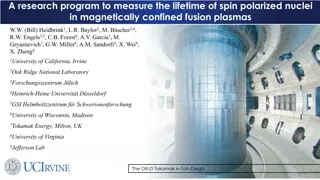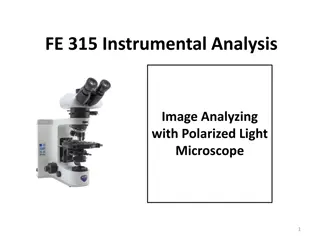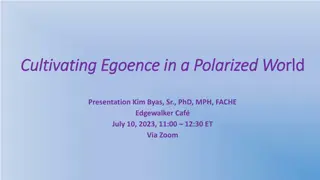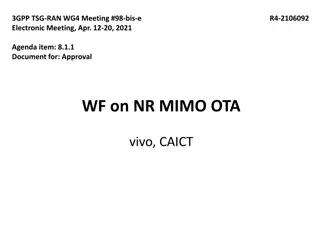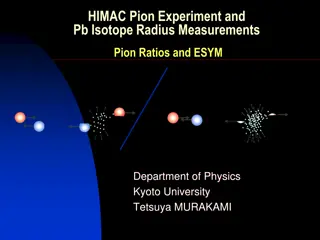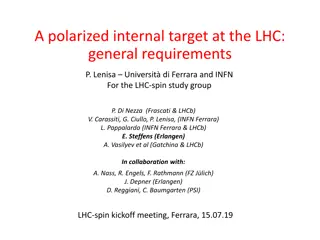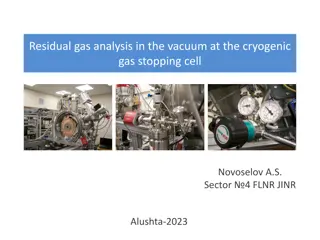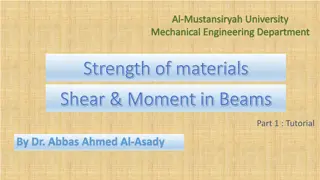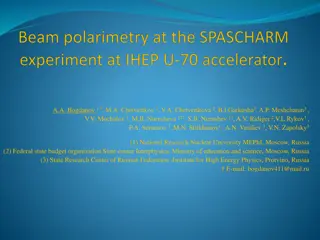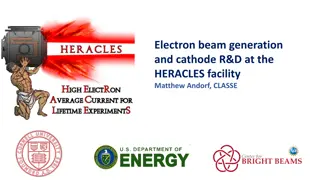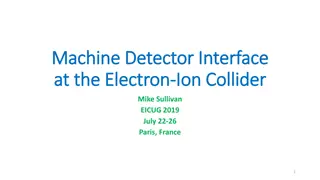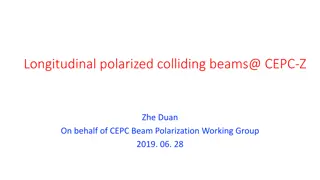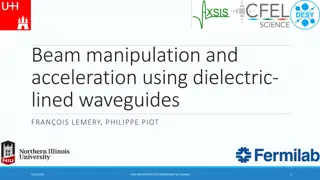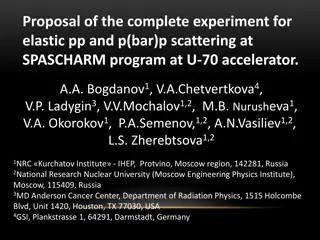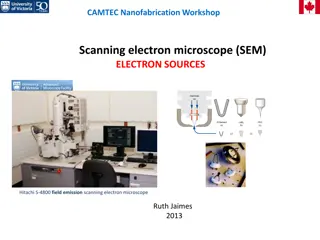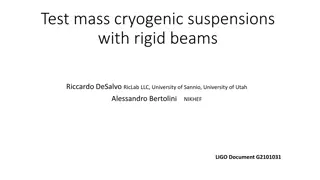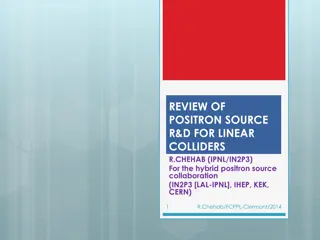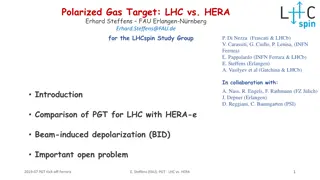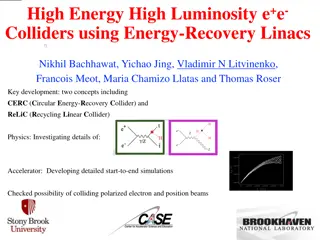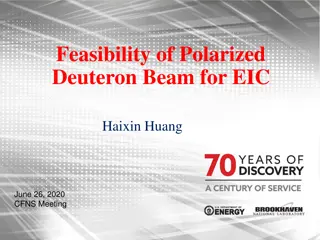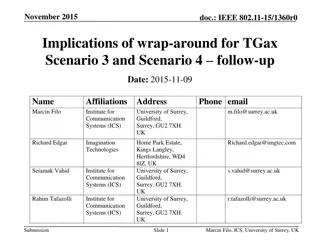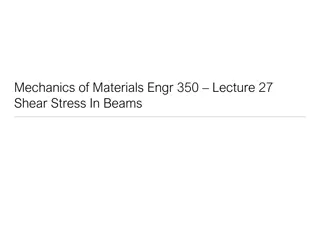High-Energy Recycling in E+ E- Colliders: Energy Recovery Linacs (ERLs) Advancements
High-energy recycling in E+ E- colliders involves the innovative concept of Energy Recovery Linacs (ERLs), pioneered by experts like Vladimir N. Litvinenko. These ERLs effectively recycle energy from collided beams, reducing energy consumption and increasing collider efficiency by maximizing luminos
3 views • 21 slides
BASIC STRUCTURAL CONSIDERATIONS.
Bridge members must support various loads and stresses. This presentation covers how loads are applied, how members are stressed, and how materials resist stress. It discusses different member types like beams/girders, simple beams, continuous beams, and columns/hangers. Stresses such as tension, co
4 views • 34 slides
Research Program on Spin Polarized Nuclei in Fusion Plasmas
Examination of spin polarized fuel in fusion plasmas to enhance energy production efficiency. Planned experiments aim to measure the lifetime of polarized nuclei for optimized fusion reactions. Key aspects include depolarization mechanisms, neutral beam heating, and fueling techniques with pellets.
5 views • 36 slides
Polarized Light Microscopy in Instrumental Analysis
Microscopes are essential tools for examining small details in samples. Polarized Light Microscopes (PLM) use polarized light to enhance image quality and study birefringent materials. This article covers the basics of microscopes, the principles of PLM, the differences between PLM and LM, and the a
2 views • 16 slides
Cultivating Egoence in a Polarized World Presentation
Living consciously requires egoence, the awareness of oneself in relationship to the whole. Through methods like spiritual practice, meditation, and journaling, one can nurture egoence to support a conscious life amidst constant change in a polarized world. The presentation explores the concept of e
5 views • 10 slides
Approval and Validation Updates for NR MIMO OTA in 3GPP TSG-RAN.WG4 Meeting
The 3GPP TSG-RAN.WG4 Meeting discussed approval for the NR MIMO OTA workplan, addressed FR2 blocking issues, and emphasized the use of polarized antenna models. Updates were made to the power validation procedure and gNB beams usage criteria for FR1 MIMO OTA channel model validation. Collaboration w
2 views • 8 slides
Nuclear Physics Research Highlights: Neutron Stars, Nuclear EOS, and Pb Isotope Studies
Explore cutting-edge research in nuclear physics, including experiments on pion ratios and Pb isotope radius measurements, neutron star observations, neutron density distributions of Pb isotopes, and polarized proton beams at Osaka University. Learn about the analysis of realistic point proton densi
0 views • 26 slides
Study of a Polarized Internal Target at the LHC: General Requirements and Preliminary Results
The LHCb Spectrometer at the Large Hadron Collider is exploring the design of a polarized gas target (PGT) similar to the HERMES target in the VELO alcove. The project aims to improve precision in luminosity measurements for antiproton production in colliding bunches. The new SMOG2 system with addit
0 views • 21 slides
Cryogenic Gas Stopping Cell for High Precision Nuclear Physics Experiments
In the field of nuclear physics, high-quality ion beam parameters are essential for both primary and secondary beams. This report focuses on the cryogenic gas stopping cell, also known as a gas catcher, designed to transform rare ion beams from nuclear reactions into low-energy beams with small emit
6 views • 12 slides
Shear and Moment in Beams
Beams play a crucial role in mechanical engineering, with two main types - statically determinate and indeterminate beams. Explore the definition of beams, loading types, and the concept of shear and moment diagrams to understand the behavior of beams under different loads and reactions. Learn how t
2 views • 8 slides
Measuring Proton and Antiproton Polarization at U70 Accelerator
Absolute polarimeters are described for the beam channel at U70 Accelerator in Russia, focusing on transporting polarized proton and antiproton beams. Various polarimeters are discussed for measuring proton and antiproton polarization, including diffraction and interference-based techniques. The exp
3 views • 37 slides
Electron Beam Generation and Cathode Research at HERACLES Facility
Research at the HERACLES facility focuses on electron beam generation and cathode development for high-current applications. Photocathodes play a crucial role in providing low energy spread beams required for processes like FEL-lasing. GaAs emerges as a promising candidate for spin-polarized electro
6 views • 33 slides
Challenges and Considerations in Electron-Ion Collider Detector Development
Exploring the development of detector systems for Electron-Ion Colliders (EIC) involves addressing various issues such as detector acceptance for low Q2 and high Q2, unique beam characteristics, and the need for specialized components like bend magnets and polarimeters. Key considerations include po
1 views • 16 slides
Achieving High Average Beam Polarization in Particle Colliders
Detailed discussion on achieving high average beam polarization in particle colliders like CEPC, focusing on longitudinal polarized colliding beams, beam polarization requirements, basic formulas, and strategies for maintaining beam polarization during physics runs. Emphasis on scenarios involving s
3 views • 16 slides
High Brightness Electron Beams: Beam Manipulation and Acceleration Using Dielectric-Lined Waveguides
This presentation discusses the manipulation and acceleration of electron beams through the use of dielectric-lined waveguides. It delves into motivations for accelerators, beam-driven acceleration, wakefields, transformer ratio, and the search for continuous smooth shapes in beam technologies. Vari
5 views • 30 slides
Investigation of Spin Observables in Elastic pp and p(bar)p Scattering at SPASCHARM Program
Measurements of spin observables in elastic pp and p(bar)p scattering at 16 GeV will be conducted at the SPASCHARM program using a unique setup with polarized proton and antiproton beams. The experiment aims to extend the energy range for spin studies and compare elastic scattering in pp and p(bar)p
4 views • 24 slides
Scanning Electron Microscopes (SEM) and Electron Sources
Scanning Electron Microscopes (SEMs) utilize focused electron beams to produce high-resolution images by interacting with a sample's electrons. The electron source, such as the electron gun, plays a crucial role in forming fine electron beams for imaging purposes. Different types of electron sources
4 views • 12 slides
Innovative Solutions for Cryogenic Suspensions Using Compressive Flexure Beams
Test mass cryogenic suspensions with rigid beams pose conflicting requirements, such as thermal noise reduction and vibration attenuation. This study explores the use of compressive flexure beams as a solution to achieve flexibility without sacrificing thermal conductance. Compressional mode flexure
1 views • 13 slides
Review of Positron Source R&D for Linear Colliders by R. Chehab
Intense positron sources, whether polarized or not, are vital for future e+e- linear colliders. This review covers different types of e+ sources, including circularly polarized photons and methods to obtain polarized positrons. Techniques such as helical magnetic undulators and Compton backscatterin
1 views • 26 slides
Comparing Polarized Gas Targets at LHC and HERA for Spin Studies
The comparison between Polarized Gas Targets (PGT) at the Large Hadron Collider (LHC) and HERA for spin studies is discussed. Key considerations such as beam-induced depolarization, beam parameters, and design aspects are highlighted. The importance of using a polarized gas target similar to HERMES
2 views • 15 slides
Strain Gauges and Deformation in Beams
Explore the concepts of strain gauges and resistors, how loading deforms beams, and Da Vinci's insights on spring bending. Learn about axial strain measurement, strain proportional to resistance change, bridge circuits, and formulas for cantilever beams. Understand the importance of strain gauge att
2 views • 9 slides
Colliders using Energy-Recovery Linacs
Developments in high-energy e+e- colliders using Energy-Recovery Linacs have led to key concepts like CERC and ReLiC, aiming to enhance luminosity and energy reach. These advancements involve detailed accelerator simulations, flat low emittance beams, energy recycling and reuse, and the possibility
0 views • 11 slides
Feasibility of Polarized Deuteron Beam for EIC
Polarized deuterons have been studied for acceleration in RHIC and EIC. Previous work by S.Y. Lee and E. Courant explored methods such as Siberian snakes and tune jump systems. Scenarios for polarized deuterons have been considered, including the use of detector solenoids as partial snakes. Further
3 views • 23 slides
Racially Polarized Voting Patterns
Racially polarized voting (RPV) occurs when the majority and minority groups vote differently, without requiring discriminatory intent. This phenomenon is studied using ecological inference to analyze how voting patterns vary across regions and districts within Virginia.
0 views • 5 slides
Nuclear Data at MSU Facility for Rare Isotope Beams
Michigan State University's National Superconducting Cyclotron Laboratory houses the Facility for Rare Isotope Beams, conducting experiments with over 1000 Radioactive Ion Beams. The project started in 2009, with reaccelerated beams reaching up to 12 MeV/u. Transitioning from NSCL to FRIB, the facil
1 views • 13 slides
Intense Muon Beams for Higgs Studies at ESS SB Project
The ESS SB project focuses on intense muon beams for studying the Higgs-related scalar sector. Key components include production, accumulation, cooling, and collider rings for Higgs studies. With a practical Higgs factory in mind, the facility features high-intensity H-source, p-compressor rings, io
0 views • 19 slides
Super-FRS MNT Reactions with Secondary Beams
Experimental plan to establish MNT reactions with slowed-down radioactive beams at the Super-FRS for heavy neutron-rich isotopes, focusing on a 1-day test with a near-stable secondary beam. Objectives include in-cell reactions with a 238U beam and proof-of-principle measurements. The proposal aims t
3 views • 4 slides
Spin Polarization and Depolarization in Particle Accelerators
This simulation explores the generation and transmission of polarized beams in the CEPC accelerator, focusing on maintaining beam polarization in the booster and collider regions. It delves into spin motion in a synchrotron, discussing the preservation of polarization in perfect and real ring scenar
3 views • 13 slides
IEEE 802.11-16/1484r1 Multi-Beamforming Procedure for 11ay
Explore the multi-beamforming protocol for 11ay, focusing on polarization antennas and dual-polarization capabilities. Learn about the exchange of multi-beamforming information between initiators and responders using dual-polarized antennas. Dive into the detailed process of multi-beamforming with p
2 views • 10 slides
Shear Stress in Beams: Understanding and Deriving Formulas
Explore the concept of shear stress in beams, the distribution resulting from bending moments, and the derivation of shear stress formulas in mechanics of materials. Understand the role of transverse shear forces and how they contribute to equilibrium in beams.
2 views • 9 slides
Side Impact Beams for Car Safety
Dive into the world of side impact beams, exploring their types, material properties, finite element analysis, energy absorption, and more. Learn about different safety measures, such as airbags, steel, aluminum beams, and fiberglass beams. Discover the differences between aluminum and steel in term
4 views • 12 slides
Angled Beam Expander Telescopes for Michelson Beams in Third Generation Gravitational Wave Observatories
Angled beam expander telescopes play a crucial role in third-generation Michelson beams for gravitational wave observatories. They enable recombining mirrors at different angles, reducing mirror dimensions, independent alignment of beams, and more. Explore how these telescopes enhance observatory re
2 views • 6 slides
Electronic Chain Based on TERA-08 Chip for Pulsed Proton Beams
Join the Haspide Project at INFN-LNS to develop an electronic chain utilizing the TERA-08 chip for both continuous and pulsed proton beams. This project involves hardware assembly, software optimization, read-out characterization, and detector testing with pulsed beams accelerated by laser-matter in
1 views • 4 slides
Multi-Beamforming in Polarized Channels for 11ay
Explore the benefits of multi-beamforming in polarized channels for 11ay technology to enhance MIMO system performance. The proposed technique supports simultaneous steering of multiple sectors using dual-polarization, reducing operation time and accommodating various antenna characteristics.
2 views • 7 slides
Undulator-Based Polarized Positron Source for Circular Electron-Positron Colliders
Explore the innovative approach of using undulators for polarized positron production in circular colliders, presented during a seminar at Tsinghua University and ANL. Learn about the comparison with conventional methods and the potential advantages for the future of collider projects like CEPC and
1 views • 25 slides
Understanding Basic Structural Considerations in Bridge Inspection and Maintenance
Explore the fundamental concepts of bridge structural considerations, including load application, member types, stress analysis, and material resistance. Gain insights into beams, simple beams, and continuous beams with illustrations and explanations. Enroll in the Technical Standards Branch Class B
4 views • 33 slides
Understanding Internal Loadings in Engineering Mechanics and Beams
Learn how to determine internal loadings in beams and mechanical members by investigating external loads and reactions. Discover the role of normal force, shear force, and bending moment, along with sign conventions and the effects of bending and shear in beams.
3 views • 15 slides
RHIC Projections and Proposed Experiments for 2014-2015 Run Period
Explore the projected experiments at RHIC, including longitudinal and transverse polarized proton-proton collisions, polarized proton-nucleus studies, and more developments outlined in talks and documents for 2014-2015. Key initiatives include increasing statistics on jet measurements, measuring sea
3 views • 16 slides
Exploring Transverse Asymmetries in Bhabha Scattering
Uncover the unexplored realm of transverse asymmetries in Bhabha scattering through a detailed study at Jefferson Lab, focusing on the development of a polarized positron injector and the potential for groundbreaking polarized e+e- measurements. Dive into the world of purely leptonic reactions at JL
2 views • 49 slides
Understanding Racially Polarized Voting in Elections
Learn about racially polarized voting, where voters of different racial or ethnic groups show distinct candidate preferences. Explore how this phenomenon impacts minority representation and discover methods to measure and analyze polarized voting patterns.
2 views • 12 slides


